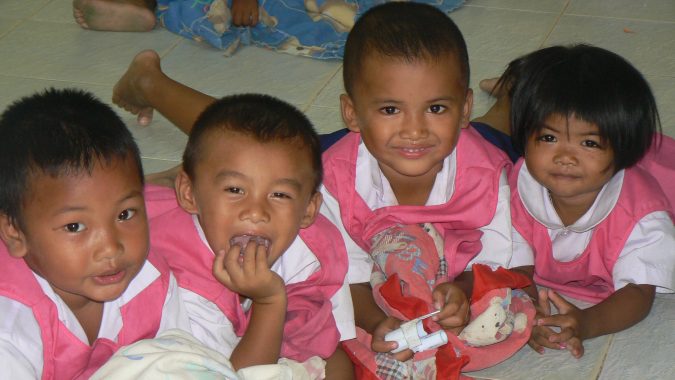
Thaïlande: lutter contre le VIH/Sida et sortir des familles de l’extrême pauvreté
FXB a été très active en Thaïlande de 1990 à 2012 et a mené de nombreux programmes de lutte contre la pauvreté, de renforcement des capacités de communautés et familles vulnérables et de prévention au VIH/Sida. Des programmes ponctuels liés à l’éducation continuent à être menés, sur la base du bénévolat, par les membres du comité de sa petite antenne locale.
Notre action en Thaïlande
1. Maison d’accueil d’urgence FXB
En 1990, FXB ouvre deux Maison d’accueil d’urgence FXB à Bangkok, en partenariat avec le CPCR et MSF, destinées à recueillir des filles échappées des bordels ou évacuées par la police. Très vite, une troisième Maison FXB est ouverte à Chiang Mai et une quatrième à Chiang Rai. Ce programme a depuis été repris par une ONG locale.
En 1992, FXB ouvre 4 Maisons FXB pour des enfants orphelins, séropositifs ou malades du sida dans la province de Chiang Mai. Elles offrent bien plus qu’une prise en charge médicale, elles reposent sur le concept du Tender Loving Care : la conviction que ces enfants auront une vie meilleure et plus longue s’ils sont accueillis dans un cadre familial, entourés de tendresse et bénéficiant de soins attentionnés (FXB a également mis en oeuvre ce concept du Tender Loving Care en Colombie, au Brésil et aux Etats-Unis).
L’ouverture de ces Maisons représente également une prise de position significative dans la lutte contre la stigmatisation et la discrimination à l’encontre de ces enfants et est une alternative dans l’accès aux soins palliatifs pour les jeunes résidents. Dès que les antirétroviraux ont été disponibles dans la région, la stratégie de FXB a été – comme pour toutes les Maisons FXB – de remettre ce projet à une ONG locale, en l’occurrence la Support for Children Foundation afin de pouvoir se consacrer pleinement à d’autres projet de développement en Thaïlande.
2. Programmes de prévention
Dès 1990 également, FXB met sur pied des programmes de prévention au VIH/sida, d’éducation et de sensibilisation aux droits de l’Homme et de l’Enfant à Bangkok, dans la province du Buriram et, à travers une radio locale, dans les régions montagneuses où vivent les Akha.
3. Hospice de soins palliatifs pour les malades du sida
De 1993 à 1995, FXB – en partenariat avec le moine Ahra Alingar (PRA ALONGOT ) – a soutenu le lancement d’un hospice pionnier dans le temple bouddhiste de Lopburi dont la vocation était d’accueillir des malades du sida en fin de vie. Cet hospice, offrant un soutien médical et spirituel aux malades afin de les aider à vivre et à mourir avec le sida, est aujourd’hui dirigé par la Fondation Dhammaraksanives.
4. Opération de sauvetage pour les prostituées
En 1994, un comité national – composé de représentants du gouvernement thaïlandais, d’ONG (dont FXB) et d’organismes tels que l’UNICEF, l’Organisation internationale du travail (OIT) et l’Organisation internationale pour les migrations (OIM) – a été formé afin de lancer un plan d’action national global pour lutter contre la prostitution et la traite des êtres humains en Thaïlande.
Ce comité a été mis en place suite à l’opération de sauvetage déclenchée en 1992 par Albina du Boisrouvray, Présidente Fondatrice de FXB, et la sénatrice Saisuree Chutikul, à l’époque Conseillère auprès du Premier Ministre thaïlandais et chargée de la condition féminine et de la prostitution enfantine. En juillet 1992, l’Association reçoit en effet un appel au secours de filles travaillant à la frontière entre la Thaïlande et la Birmanie. Ces jeunes femmes étaient soumises à un véritable esclavage sexuel, battues, mal nourries et très exposées au VIH /sida. Albina du Boisrouvray alerte alors Saisuree Chutikul. La police procède à un raid et libère 153 femmes et jeunes filles, dont 95 jeunes birmanes. Agées de 14 à 20 ans, 50% d’entre elles sont séropositives. Elles seront rapatriées dans leur pays d’origine quelques mois plus tard. En septembre 1993, FXB y ouvre un projet-pilote qui propose une réinsertion individualisée, en fonction des aspirations, des aptitudes de chacune de ces jeunes femmes et des possibilités du marché économique au Myanmar.
5. Reconstruction suite au tsunami
En 2005, à la suite au tsunami de décembre 2004, FXB s’est investie dans un projet de reconstruction de bateaux pour des pêcheurs « Mokens » et a organisé durant plus d’un an des séances de soutien psychosocial dans des écoles de Phuket et de Phangnga.
6. Lutter contre les causes multidimensionnelles de la pauvreté : 5 projets de développement économique et communautaire VillageFXB
Face à la propagation de la pandémie du sida restreignant notamment la capacité des familles et des communautés à accueillir davantage d’orphelins et d’enfants affectés par la maladie, FXB a également décidé de répliquer, en Thaïlande, son modèle de réduction de la pauvreté VillageFXB, dont les résultats sont très positifs en Afrique.
De 2006 à 2012, FXB a mené 5 programmes VillageFXB dans les provinces de Buriram et du Maha Sarakham. Ces programmes ont permis à plus de 2,000 enfants et adultes d’atteindre l’autonomie économique et sociale, d’avoir un impact positif sur leur communauté et de vivre une vie digne dans leur pays. Ils ont notamment donné la possibilité à des grands-parents vulnérables de protéger et d’élever des orphelins du sida et du tsunami qu’ils avaient recueillis.
Notre impact en Thaïlande

ont été menés dans les provinces de Buriram et du Maha Sarakham de 2006 à 2012.

ont atteint l’autonomie économique et sociale et on pu avoir un impact positif sur leur communauté et vivre une vie digne dans leur pays.

A travers ses interventions, FXB a également contribué à ouvrir la voie vers une amélioration de la législation nationale thaïlandaise grâce à la « Loi sur la prévention et la répression du trafic de femmes et d’enfants » (1997).

